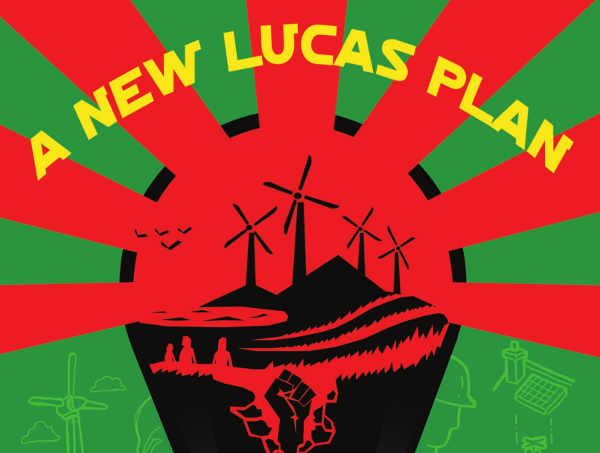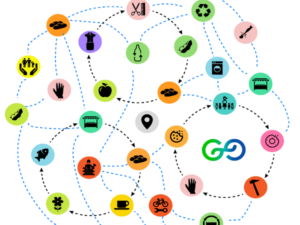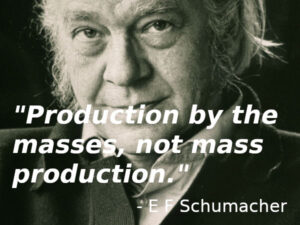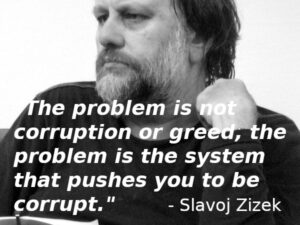Is technology the problem? Conversation with Dave King of Breaking the Frame and the New Lucas Plan

This is a conversation between Dave Darby of NonCorporate.org and Dave King of Breaking the Frame and the New Lucas Plan. Dave (K) is opposed to the ‘technocracy’ that he describes as the root cause of environmental destruction and lack of democracy.
Dave Darby: Dave – what’s your ‘lift pitch’ (or ‘elevator pitch’ as they say in the States – i.e. what you’d say to someone very influential, who could help you, if you shared a lift with them for one minute)?
Dave King: OK. Technocracy is system of control over nature and over human beings through technology and technological discourse that has existed for the last 400 years, and is fundamental to the whole concept of modernity and capitalism. It’s produced a set of disastrous effects in the world, and the technocratic philosophy of control over nature is just as much responsible for the environmental crisis that we’re facing now as is the more obvious capitalist drive for profit and resource extraction. The key popular ideology of technocracy is the religious belief in progress through technology.
So what are we supposed to do about that?
Well, there’s not one thing that we have to do about that. There’s a whole range of interventions that people can make against the particular manifestations of technocracy that they come into contact with – just as all political action tends to be about the immediate thing that confronts you. A lot of things already exist. There’s the movement against industrial agriculture, there’s greater awareness of the problems caused by information technology / internet / big data / surveillance etc. Political campaigns already exist. But why I keep stressing the technocracy concept is because people often don’t see that there’s a common philosophy behind these kinds of things – a philosophy of technological control. Once people start to see that, then we might start to see a shift.
This wouldn’t be new. There are plenty of examples of periods in history when people understood technocracy very clearly – most recently in the 1960s and 70s, when there was a lot of discussion within radical politics about the idea of technocracy. It was the central idea of prominent radical thinkers of that time, like Herbert Marcuse and Ivan Illich. Since the rise of neoliberalism (which has been an era of hyper-technocracy as well as hyper-capitalism), that understanding has faded away. On the left, what’s weathered neoliberalism is orthodox Marxism and a managerial type of pseudo-socialism of the New Labour variety. The latter is pure technocracy, while Marxism with its belief in progress through technology and industrialism often adopts very technocratic solutions.
And the younger left seem to have disappeared into a world of identity politics, and don’t seem to be questioning the system very much. Is that fair?
I think that’s right. I think that part of what neoliberalism has done to the left is exactly that. I think that’s important because an anti-technocracy approach is about paying attention to the material structures of the world and how those material structures drastically shape what we can do and what we can think – and unfortunately, identity politics doesn’t tend to look in that direction.
Explain more – how did you come to your conclusions?
I used to be a molecular biologist. I did my PhD in the second half of the 1980s. Then I left laboratory science and joined a group that was starting the campaign against GM food. They wanted a scientist on board to explain the scientific aspects of that. That was my introduction to food politics and to environmental politics.
I’ve stayed in the field of critique of technology ever since then. I moved on to the field of human genetics, which raised a raft of issues that are quite close to my heart – I’m Jewish, and so I’m naturally concerned about the way that the eugenic ideology that led to the holocaust is returning. But overall, I’ve stayed in the critique of technology field, that seems to have been deserted by the left. In the 80s there was a wonderful organisation called the British Society for Social Responsibility in Science, which developed a sophisticated understanding of technology as very much not politically neutral, as the standard liberal model of science and technology states. I’ve stuck with the critique of technology, because it provides a very different angle on politics from the conventional one of money, economics, corporations and capitalism.
Technology is an integral part of the dominant system and is actually a system of its own that we need to pay attention to, because it shapes society in all kinds of ways that are not captured or understood properly if your whole focus is on money power and corporations.
Well, our focus is on money power and corporations, and from conversations we’ve had before, I see your position as: technology has its own momentum, because if corporations don’t invest in cutting-edge technology, they’re going to fall behind in the race for profits. So it’s technology that is actually in control, not the corporations who are just chasing after it. Is that right?
Not exactly – there is that dynamic of competition between corporations to be at the cutting edge of technology. This really took off after the second world war, when heavy industry started to move to poor countries, and Western countries focused on high-tech development.
But I think there’s another way that technology has its own momentum, due to the technocratic philosophy of scientists – i.e. we want to understand nature so that we can control it, and define this as ‘progress’. The phrase you hear regularly is the ‘technological imperative’ – i.e. scientists and technologists believe that if something can be done, we must do it.
But I wouldn’t exactly say ‘it’s technology that is in control’. Until we have AIs that design robots and more AIs, it is of course literally under human control. But the overall system of technocracy means that there is an almost irresistible drive to develop any technology that is feasible. On the other hand, the success of the GM food campaign, amongst others, has shown that we can stop technology, contrary to the technocrats who insist that it’s inevitable.
Yes, I also find it ironic that it’s scientists who are telling us that we’re destroying nature, but it’s also scientists that are telling us that human ingenuity and technology will sort it out – I find it really irresponsible.
I agree – it’s a reflection of the utter crisis of industrial capitalism after 200 years that that is always their basic answer. To some extent it always has been, but it’s become particularly acute now, as we have such a complex web of problems. It’s an ongoing process – a new technology is developed, it causes a set of problems in the world, and the response is to try to find a technological solution to that set of problems, in a never-ending spiral.
What do you do now?
What I’ve been doing for the last nine years is trying to educate people about the politics of technology. One way I did that was to organise a series of events celebrating the 200th anniversary of the Luddites. We chose to do that because the Luddites are perhaps one of our best examples of a movement against both technocracy and capitalism. They understood that the function of the new industrial machines coming into use at the time were to extract value from them, to create profit for capitalists. But they were also sensitive to other aspects – for example that the machines would set the pace of their work – to regiment it and force them to keep up. They could feel very directly how they were being dominated by machinery.
Another very crucial thing was the skills and knowledge that craftspeople had in their hands and minds were abstracted and embodied in machinery, and the machinery replaced the people. This debate about machines replacing humans is still very much alive.
It was a very interesting experience, because the word Luddite has been stigmatised to mean more-or-less village idiot who wants to go back to the Middle Ages (because history is written by the victors). In fact, the Luddites’ slogan was that they would ‘put down machinery hurtful to Commonality’, i.e. to the common good and the common people. Despite the stigmatisation of the Luddites, we came across many, many people who were pleased that we were commemorating the uprising, and who understood and identified with the Luddite rebellion.
Another thing that I like to get out there (and that you might find challenging) is the concept of ‘green technocracy’ – i.e. technocratic thinking and policies and ways of operating in the green movement. The way I look at it is this. Technocracy started 400 years ago with the Scientific Revolution, and Francis Bacon’s famous phrase ‘knowledge is power’. What he meant by that was power over nature. That developed through the 17th, 18th and 19th centuries into industrial capitalism – maximising order, for the sake of efficiency of goods production for profit. This has swept everything before it.
But it’s always been based on a crude, reductionist understanding of nature – a ‘billiard ball’ mechanistic model of the universe; and if nature doesn’t do what you want it to do, you force it. This is seen very clearly in industrial agriculture and its effects – soil erosion, toxicity and biodiversity loss.
I’m not feeling challenged yet.
That’s just the background. What had happened by the 1960s was that the gap between that crude mechanistic understanding and reality became too wide to be suppressed, and we started to see severe symptoms of damage, highlighted by Rachel Carson in Silent Spring. At that point, scientists decided that they needed a more sophisticated description of nature, called ecology. What they didn’t describe were the social, political and economic forces within industrial capitalism that were the root of the problems. Because the leading figures, who set the agenda of the green movement were scientists, they decided that the solutions were technical rather than political. This techno-fix approach is central to technocracy.
There’s a very big difference between those two ways of looking at the problem and its solutions, and I’ve been arguing that the mainstream of the green movement have had a technological rather than a political approach. So the green approach has not been to try to change the economic structures, it’s been to improve technology.
Dave, I agree with you – I see the root of the problem as the economic system, but I also feel duty-bound to honour ecologists for pointing out the damage that we’re causing to nature in the first place. Most of them are not even thinking about solutions – they’re just flagging up the problems. At the very least, they’re helping to wake people up to the fact that there’s a problem, and the future’s not looking rosy. For example, a report in the Proceedings of the National Academy of Sciences of the US last year concluded that we’re headed for ‘biological annihilation’ – and if that doesn’t make people realise that there’s a huge problem, what will? I’m not really expecting them to come up with radical political solutions – that’s not their job.
True enough. The IPCC have done excellent work too. But the scientific facts that they’re looking at are symptoms – and they’re not looking at the root causes. I’d argue that the reason they’re not is precisely this technocratic philosophy that I’m talking about. It’s how scientists are trained. The solution is always seen as technological – it’s always de-politicised. It purposely looks away from the social, political and economic complexities that are actually the root causes of the problem. They tend to say that the problem is technical and the solution is technological.
Oh, if they actually say that, I’d agree with you, but if all they say is ‘there’s a huge problem with ecology – that’s what we’re reporting, because that’s our job, and it’s up to other people to come up with solutions, whatever they are’, then I salute them (and jump in to point out where the causes lie – in the economy – and that’s where the real battles lie).
Yes, and you’re likely to lose those battles, because authority rests with those who have a technocratic outlook, because that benefits capitalism, and that’s where the power is. That is the real power of technocracy – to frame what the problem is, and therefore what the solution is. This allows them to say that people complaining about capitalism should be ignored.
A critical example of this is the emphasis on population control in the green movement, which is a classic example of a mis-framing of the problem. I don’t believe the problem is about absolute numbers of people, it’s about consumption, and that’s really a problem of the industrialised countries.
I sort of agree with you – in that the world could possibly support 20 billion people if we all consumed like Tanzanians, but maybe less than two billion if we all consumed like Americans. I would ask why 20 billion humans on the planet is better than 2 billion though – for example, Japan and New Zealand are two similar-sized islands in the Pacific. But New Zealand has a population of less than 5 million, and Japan has over 120 million. Does that mean New Zealand is a worse place to live? I don’t think so. The reason I don’t tend to focus on population though, is that the world’s population is set to plateau and start to fall, but all countries seem to want to continue growing their economies until it kills us.
What I’m arguing is that the techno-fix approach allows technocrats, including green technocrats to focus on technological solutions like abortion, contraception etc. rather than looking at political and economic solutions.
What’s your ideal (but not science-fiction) scenario – artisan production and smallholdings?
I don’t know. There’s going to have to be a transition, which is going to be really messy. As to whether all production will end up using artisanal methods – I think that’s fairly unlikely. There’s clearly got to be a big shift in that direction, but who knows where it will settle. I do honestly think that the next 100 years will be very destructive.
There was a UN report recently that concluded that if the entire world’s agriculture shifted to organic, mixed smallholdings, it would feed more people, with less environmental damage than the current monoculture, industrial agriculture model.
Yes, I think we’ve known this for a long time.
What do you think about what we’re trying to do with NonCorporate.org? We’re trying to help people to switch away from multinational corporations, and to help co-ordinate the non-corporate economy to punch above our weight. I think it helps workers take control of the means of production, but not in a centralised or a statist way.
Great, but it’s not enough. Something else will be needed.
What?
I don’t know. It would be ludicrous to start talking about some sort of violent uprising in the 21st century. It would be crushed pretty quickly. These things tend to happen when systems fall into crisis – something else rises up to take its place, and things can change very quickly. But what you’re doing is definitely worth it – it’s something that can happen now. I get tired of groups who say ‘we’re doing what’s needed – you’re doing the wrong thing’ – there are lots of things to do, and people can do what they’re good at or what they think can make a contribution to positive change. That could be protesting, campaigning, building alternatives etc. – we have to stop arguing.
People reading this might see the irony of recording our conversation over the internet and then writing it up on a computer and blogging on a website. Would you be happy to keep the internet and solar panels (provided by co-ops of course)?
I don’t know what should be kept. It’s obvious that the tools and systems provided by information technology have great uses. But they didn’t exist in the 1970s, and I can’t really see that life was worse then. In many ways I think it was better. The majority of people in the world still don’t have access to the internet, and the problems that they have are caused by economic injustice rather than lack of technology.
[Sorry Dave, this is post-interview, but I had to look it up. The majority of the world do now have access to the internet – https://internetworldstats.com/stats.htm]. But the use of the internet and solar electrical generation (but not the manufacture of panels, plus computers and the giant servers required) are actually technologies that can be convivial, as Ivan Illich put it (meaning that they can be owned by individuals and communities), in a way that coal-fired or nuclear power stations can’t.
But the internet is a huge example of bog-standard industrial capitalism. Its environmental impacts are spiralling out of control. When you calculate the energy usage of all the computers, tablets and phones (in their manufacture as well as their use, plus the data centres, power lines and dealing with all the waste when these things die, the energy use is huge.
[Also post-interview, but I’m sure you’ll forgive me this time, as it backs up what you’re saying – I did some research and found lots to back you up. This, for example, explains how efficiency won’t solve this problem – it’s the sheer quantity of electricity required that’s the problem, and that’s not going down because of the Jevons paradox, regardless of how efficient it gets.]
Ultimately, the internet is based on a set of elite technical knowledge that very few people understand, and therefore lends itself to control by a very small number of very large economic actors. We’ve seen that it could get worse too, with the net neutrality battle, for example. As with all Western industrial technology, the problem is elite control and ownership, and that will put a great deal of power into the hands of very few people, which has huge implications for democracy. I think it’s more likely to become ecologically sustainable than convivial, actually. Conviviality is partly about ownership and control by local communities, but probably more about scale and the type of knowledge that underpins it.
Also, of course, solar panel manufacture is far from sustainable or convivial.
So what’s a better way to generate electricity – or do we not have electricity?
No, I’m certainly not advocating that we don’t have electricity. But as far as I know, there aren’t any means of electricity generation that aren’t extremely problematic in one way or another. Small-scale wind is good, I think.
But larger turbines are more efficient.
Efficiency is the prime criteria of technocracy.
What if the turbines were owned by a community energy scheme? Surely you’d want them to be as efficient as possible?
Yes, efficiency has its place, but the point is that in a technocratic, capitalist society, efficiency is the value that’s held above all others, and that has to change. We have to reintroduce human values into society that had been driven out by technocracy. I believe that traditional human values are, not by accident, what allow us to exist sustainably on this planet – that’s how they developed over millennia.
I know you know Mondragon, in the Basque Country – a federation of co-operatives encompassing over 75,000 people, and they produce high-tech goods, amongst other things. They’re helping to build the Solidarity Economy, but surely they can’t produce machines that are not efficient – they’d go out of business.
That’s a trap, due to the overwhelming pervasiveness of technocratic values. If we try to find ways to produce things that are consistent with our values, but within the existing system, you’re right – you can’t sell a washing machine (say) that isn’t efficient. Which is why we have to change the system. Washing of clothes has never been done by machines until very recently, and even now, a large proportion of the world don’t use washing machines. If we want to live sustainably, things might have to be done in a more labour-intensive way.
I guess there’s no sustainable way to spray pesticides, which are basically poisons, into nature, and if we want to continue to use synthetic fertilisers rather than organic matter, we shouldn’t be surprised when the soil erodes away. We can’t continue to do that, so mixed, organic smallholdings is the answer. And that type of agriculture is more labour-intensive. That kind of work isn’t for everyone, but a lot of people love it – don’t really want to do anything else.
And we don’t have to go back to the stone age – there can be intermediate ways of doing things. It makes no sense whatsoever for every family to have a washing machine. All it takes is organisation – not a technological solution – to increase the sustainability of the washing machine industry, and that’s to get rid of 80% of them, because we learn how to share them. But that’s not the kind of solution that capitalists want to hear, because it reduces their profits.
One more thing about efficiency though. Say that Mondragon manufactured solar panels. And say those solar panels required more energy to manufacture than they’d ever generate in their lifetime. That’s a totally useless piece of kit. It has to be efficient – otherwise just don’t make them. And that’s the same with a food crop – it has to provide more calories than are burnt producing it, otherwise it’s not worth growing.
OK – what industrialism replaced was commons-based subsistence. We would do well to move in that direction again, I think – commons-based production. When we’re moving in that direction, yes, efficiency is important. In the current system, all efficiency does is increase profits for the corporate sector.
So how do we move in that direction? Our approach is that the first steps must be to help the public withdraw from the corporate sector and move to a commons / co-operative / small-scale / non-corporate economy, which already exists and is looking for customers. It’s doable – it’s not utopian.
Yes, people are doing just that. The Ecological Land Co-op is a good example when it comes to land ownership – plus the other organisations highlighted on NonCorporate.org. So that’s part of it, yes. I think it’s going to be a very messy process, with lots of threads to it. But that transition will happen as a matter of necessity, and the defenders of the existing industrial capitalist system will fight tooth and nail to prevent the transition. No-one can really guarantee that a significant proportion of humanity will be around after the transition. But nevertheless, that transition has to happen – the current system is totally unsustainable.
For me, the process has to start with education – that frees people’s minds, not just from the corporate provision of what they consume, but also questioning the whole model of industrial production. We have to go back to basics, and ask the question ‘what do we actually need?’
I’d like to just mention the Lucas Plan here. Their key phrase was ‘socially-useful production’ – for people’s real need rather than for profit. A lot of what we consume is foisted up on us by the capitalist / industrial system, but we don’t need it.
I guess they’d never sell razors with 5 blades, or washing powders that produce ‘bluey whiteness’ and so on if the advertising industry didn’t exist. And it’s much more profitable to produce jet fighters than it is to provide housing and food for poor people.
Yes, the ecological crisis is going to force us to start taking this question seriously. If we’re going to live in harmony with nature, we’re going to have to have more frugal lives, whether we like it or not. Living out of harmony with nature isn’t a long-term option. We have to dump the industrial, consumerist mindset, or it will make our planet uninhabitable by humans.
I’d like to say again though, that I’m not advocating some kind of hunter-gatherer lifestyle. I think the word ‘intermediate’ is useful. There was an ‘intermediate (or appropriate) technology’ movement in the 80s, based on the philosophy of E F Shumacher, who advocated a technology suitable for poor countries who wanted to move from a subsistence economy without adopting the same kind of large-scale, centralised, profit-extracting industries as the West. Like most things, it became overtaken and co-opted by technocratic thinking, but nonetheless, the basic concept is good.
What’s the modern version of the word ‘Luddite’?
I actually call myself a Luddite. I like the word convivial too, but I want to reclaim the word Luddite, because it provides a link to people who struggled against the same kind of oppression that we’re trying to throw off now. That solidarity across time I find important.
I’d like to know what you think about this: I don’t think the right is necessarily a friend of corporate power – the right just opposes centralised state power. but so do I. So I don’t think the labels left and right help the cause (even if academically correct) – we don’t want half the population against us from the start; plus the left vs right battle means that left and right cancel each other out, and the corporate sector stays in control. The non-corporate economy can be both free and non-exploitative, i.e. you can set up in business and produce and sell anything that people are prepared to buy, as long as it doesn’t hurt anyone else, but you don’t get rewarded for other people’s work. So we have self-employment plus co-operative institutions of some sort. There’s no need to alienate the right, is what I’m saying. This also means that the economy doesn’t have to constantly grow to provide returns to shareholders. So an economy that is based on a free market, but without exploitation, and that doesn’t have to perpetually grow, should keep the right, left and greens happy.
I can only be who I am, based on where I’ve come from. And I came out of left politics. I understand the desire to overcome that left / right constant battle, but I’m not sure it can be transcended and made irrelevant yet. It is a brute fact of the world – some people own the means of production, and oppress others who are forced to sell their labour to the people who own the means of production. The world is just organised that way. However many times we say the left is dead, under industrial capitalism, it’s still all based on exploitation, so lots of people are going to be struggling – and that’s exactly what’s happening.
I suppose I’m just thinking pragmatically. Why give something a label that is going to immediately generate resistance from at least half the population in the West – more, in fact, if you look at who gets elected and what the most popular media are?
So you’re proposing a re-branding exercise?
Or maybe a de-branding exercise?
I’m not sure that’s going to work. Class warriors on both sides will label it for you, even if you don’t.
Recently I had a discussion with a group of city boys. Because I was critical of the corporate sector, they assumed I was a statist, and came at me with guns blazing. After a while though, they realised that what I was suggesting (i.e. the Solidarity Economy) was actually a free market (freer than in the current economy, in fact), and nothing to do with the state. They labelled themselves libertarian, because they don’t want to be told what to do by the state, but when I said that I was probably more libertarian than them, because for them, being told what to do by the state was a problem, but not being told what to do by bosses in a capitalist firm. For me, that was a problem too. And anyway, how could corporations keep their monopolies without a state to enforce copyright laws, to give them huge contracts, to listen to their lobbyists, to allow them to avoid taxes whilst taxing small businesses etc? They honestly didn’t have a problem with what I was saying, and one of them said that I’d influenced his position. Why would coming at them from an antagonistic, left vs right position have been better than that, in pragmatic terms (unless you just like a good intellectual brawl – and possibly a physical one)?
In a sense, that’s good, but I think there are huge problems with libertarianism. Firstly, and most obviously, the rise of libertarianism that we’ve seen is totally a product of neoliberalism.
I’d say that that’s not really libertarian. It only takes a minute’s thought to realise that being under someone else’s control is being under someone else’s control, whether they’re a state bureaucrat or a capitalist. There’s traditionally been a difference in the meaning of the word libertarian in Europe and North America. In America, it’s come to mean being free from state control, and in Europe it means being free from from anyone’s control. I think the European meaning is more consistent and more accurate.
There’s plenty of the American version over here now. And this kind of libertarianism is a product of technocracy – paradoxically, because we think of technocracy as this top-down, hierarchical system that gains control over people through technology. But since the rise in information technology and neoliberalism, we’ve had a different form of technocracy, which is all about the idea that with sophisticated, computer-based systems management, you can release people from many of the constraints and hierarchy of the industrial production system developed between 1900 and 1970. You can give people much more autonomy – to work when they like, to have much more control over their own work and to be more creative. This is a pseudo-freedom that is intended to make people more productive and to cost the corporate sector less.
Have you seen any of Adam Curtis’s films, like ‘All Watched Over by Machines of Loving Grace’? The Californian, hippie ideology of getting rid of oppressive systems, morphed into the idea of machines overseeing us and doing the drudgery work, in a politically-unbiased way, so that we can be freer, more creative and have more leisure time. Alan Greenspan, one of the most powerful people in the world, subscribed to this kind of philosophy. I regard this philosophy as fundamentally pathological.
I agree, but the kind of libertarianism I’m talking about is more mutualism I guess. Do things with other people if you want to, or do them alone if you prefer, but don’t exploit other people by extracting profit from their work. Everyone should get the full value of the work they do. It seems like basic morality to me.
I agree with that, but I think you’d struggle to get most people who label themselves libertarian to subscribe to that. And the problem I’ve always had with libertarianism, even of the mutualist type rather than anarcho-capitalist type, is that it’s utopian, and the only way it can be achieved is with a concerted effort from the state. For example, how will we break up corporate monopolies?
We’ve already mentioned Mondragon – that’s a federation of small co-ops. It reminds me of Radical Routes’ fish image, where lots of little fish are being terrorised by a big fish, until they realise that together, they are more powerful than the big fish, and they drive it away. For me, federation seems much more likely to succeed than petitioning governments who are under the sway of corporate money, jobs and lobbyists, and are afraid of capital flight if they don’t roll out the red carpet for the corporate sector. And actually, this isn’t utopian, because it’s already happening, on the ground, along with community energy, credit unions, community-supported agriculture, worker co-ops and all the other alternatives to the corporate sector. It’s the state approach that seems utopian to me.
I love the Mondragon approach, but I wonder how much it’s succeeded in replacing the corporate bedrock of the economy where it operates – infrastructure, the financial system, transport system, construction etc.
I’ve just thought of Rojava as well – a decentralised, stateless enclave of 3 million people in northern Syria. Rojava and Mondragon actually exist in the real world, so why are they utopian? It’s working – let’s grow it.
All I meant by utopian is that solving the problem by building the Solidarity Economy will take a long time, and the problem the world faces now is how to get there fast. There are lots of visions for the world after industrial capitalism, but no-one has a clue about how to get there.
I do.
OK, I’m not saying you’re wrong – at all, in fact. I think your way of doing it is very important and definitely part of the picture, but I don’t think it will succeed on its own, because the industrial capitalist powers that be will close it down unless we have a massive political movement behind it.
Sure. We’ll take any help we can get. But what kind of political movement, and how do we build it, and what will it do?
Well, now we’re getting to the big questions. In many ways, it brings me back to the Lucas Plan.
That sounds quite similar to the NonCorporate approach.
In many ways, it is. Where I think it differs is that the fundamental value of the Lucas Plan is not freedom, it’s solidarity. It came out of the socialist movement of the 1970s, where the strongest value was solidarity – not about working together, but a solidarity in struggle against the management of Lucas Aerospace. And if you force me to choose between solidarity and liberty, I’d choose solidarity.
Ah, I think we may have found a real difference in our positions. We’d both like to see a Solidarity Economy, but without freedom, I don’t think that’s possible. You can’t force people into solidarity. It has to be voluntary.
It does, but I think there’s a natural human tendency towards solidarity that’s been dismantled by hundreds of years of real effort to force us into this atomised society where we all think of ourselves as individuals first and part of a collective second.
It might be just an academic argument really. I think they’re both necessary. I don’t think you can have one without the other. You can’t have involuntary solidarity, and you can’t have isolated freedom.
Yes, OK, I agree with you. But you asked why the New Lucas Plan is different from what you’re proposing, and I think the New Lucas Plan starts from solidarity, and I think its philosophy is that the only way that humanity as a whole is going to get through the crisis we’re facing is through really emphasising solidarity and working together, and liberty will emerge from that philosophical, social and cultural transition beyond industrial capitalism.
There’s a very well-meaning, middle-class, liberal philosophy that wants to work together, but they don’t have the instinct for the collective that working-class struggles have.
Let me put it another way. If you want to join a collective farm, then great. I lived on a commune – a registered housing co-op with 20 acres, for 13 years, and loved it. But also, if you just want to have a smallholding, to provide food for yourself and your family, and to sell the surplus at the local market (or to set up a little artisan workshop, and sell your produce) and just to be left alone – then you should be completely free to do that as well.
Yes, I agree with you, but well – maybe those people have to be watched.
Sure, you don’t want someone starting out on their own, but really they want to become an empire, owning a huge area of land and getting other people to make their profits for them. But also, you don’t want a system where people can’t just be left alone to do their own thing if they want to. That’s basically mutualism – you don’t extract value from other people’s work, just your own, whether that’s as a self-employed person, or working together with other people. Have you come across Kevin Carson?
No
He’s American – I’ve got three of his books – Studies in Mutualist Political Economy, Organisation Theory and The Homebrew Industrial Revolution. He’s saying some very interesting things. I’m going to be reading and blogging about more of his stuff. What he’s saying I think is that we should organise ourselves in ways that don’t allow anyone to extract wealth from communities and from the work of other people. You only get rewarded for your own work. If you want to be self-employed, fine. If you want to work in partnership with another person or a few other people, fine; and if you want to grow, co-operativise – otherwise stay as a sole trader or a partnership. I think collaborative credit might interest you too – it prevents concentration of wealth and doesn’t require banks. More here about that.
I’ll look out for all that. The other thing I wanted to say about technocracy is that a lot of the new developments are actually about decentralisation.
Well, not true decentralisation. The corporate sector makes sure that whatever the technology, or the social structures and decision-making processes, the wealth is centralised and concentrated. If it weren’t, they wouldn’t be interested in doing it. There has to be a route to extract wealth. If there isn’t, they’re not interested – that’s their model.
OK, yes, they might look like networks, but they’re geared for extracting value, I agree. But it still sounds as though things like collaborative credit – or even to some extent things like 3-D printing, blockchain, holochain etc. – are still technical fixes, with a decentralising model and a set of rules that mitigates against extractive capitalism, and I guess what I’d try to caution against is that we’ve heard about lots of wonderful-sounding techno-fixes before that haven’t delivered. Ultimately, I still come back to the fact that real change is not about changing the rules of the game so that the game appears nicer, it’s about changing the social and economic structures from the bottom. The push has to come from grassroots.
I agree. And by the way, collaborative credit can be done with pen and paper. Computers just mean that it’s faster, more secure and can spread more quickly. But if civilisation fell over, it could revert to pen and paper – or even just be held in people’s heads, as it used to be before money became widespread.
It sounds a bit like barter.
It’s easier than barter. With barter, you have to find someone who’s got what you want, and wants what you’ve got, so that you can trade. With collaborative credit, you just get credits for providing something for somebody, or debits for obtaining something from somebody. I’m going to be interviewing people who are producing software to allow you to get credit for (say) painting someone’s house in London, then going on holiday to Spain, and paying for a cab with those same credits. And it doesn’t allow wealth to be extracted from the system. You only get credit for doing something useful for someone.
Well, I don’t think we should be flying to Spain on holiday.
No, neither do I – that was a bad example. We don’t fly, by the way. But here’s something we do. We get olive oil from an organic family farm in Portugal, which is brought to the UK by sailboat that is owned by a co-operative in Brighton. It ticks so many boxes it’s insane. But we really want to support them. They’re called the Sailboat Project, and I blogged about them here. It’s really convivial, it’s part of the solidarity economy and it’s sustainable. What’s not to like?
Sounds good, but actually I think that humans should learn to live without very much of what they need in life coming from international trade – as humans have done throughout history.
I agree. But organic olive oil from a family farm via co-operative sailboat is such a gem that I think it should be supported. If all international trade was via sailboat I guess the volume would fall dramatically anyway.
One final question – how far would you like to roll back technology, and who draws the line? If you said no plastics, nuclear weapons or pesticides, I’d agree with you. But what about electricity, metal smelting or anaesthetics?
I think the answer is that no-one knows – but the priority right now is to start moving in the right direction.
Well, good luck Dave. I hope this interview brings what you’re up to to a wider audience. I think that what you’re saying about technocracy is crucial if we’re going to bring about real change, and I’d like to keep it in the mix.
The views expressed in our blog are those of the author and not necessarily lowimpact.org's
16 Comments
-
1Mike Eaton October 14th, 2018
A very interesting and informative article, thanks to both of you. Actually within reason I agree with you but I do have a couple of small points. In the first instance and personally I am a Luddite – I’d rather have oil lamps than electricity anyday of the week (we won’t go into the best type of fuel for oil lamps at the moment – surfice to say it comes from one of the most destructive systems on the planet), but that is personal. How far I’d want to see society in general go that way is disputable.
Secondly and more importantly is the fact that whilst reducing both technoligy and politically down to a workable level for society in general – I love the idea of loosely bound city states rather than ginormouse (?) countries, giving everybody a chance to work together on a small and practical scale producing what they need together rather than the more destructive method of producing large amounts of something that maybe the world might need, maybe not. But fir several hundred years we have slowly moved in that direction. Rather like wars and violence, ahundred years ago we had a terrible war that was billed as the war to end all wars, it ended, then several years later we did it all again! Not what I’d call learning is it? Going on this “grab method” is something we humans have been doing since we lived in trees so to speak. If we hadn’t have done it I doubt if we’d have got out of those same trees. Thus if we go the way that many are suggesting (which I believe is a very good way to go) what would be in place to prevent that happening again – it would be a shame to spend many years slowly getting back to a sensible level and saving the world etc. to find that all that work was in vain as the world returns to this terrible system we have in place now??
Of course we know that life would be better but what about our childrens, childrens, children? What is to prevent them from the desire to return to what by then would be Utopia – the Garden of Eden so to speak. I’d be very interested in your views on this
Thank you
-
2Peter Green October 14th, 2018
Audio version – https://greenpete.co.uk/wp-content/uploads/Breaking_TheFrame-LowImpactLiving.mp3 (14MB)
Again I ask, is anyone interested in these audio versions?
-
3Dave Darby October 14th, 2018
Mike – ‘giving everybody a chance to work together on a small and practical scale producing what they need together rather than the more destructive method of producing large amounts of something that maybe the world might need, maybe not.’
Yes. And it’s the advertising industry’s role to generate the ‘need’, to maximise consumption.
Not sure what you mean by your question – what would stop us getting back to the point we’re at now if society collapses? If that’s your question – I think that if we’re knocked back to the stone age, we’ll be starting again with a much, much poorer ecology, and so we may just peter out. If we do manage to get back to where we are now, no, I don’t see any reason we wouldn’t do the same thing again – but again, we would have removed more species, and so I think that ecological and social collapse causing a massive reduction in population would mean extinction – either directly, in the short-term, or inevitably, in the long term.
If you mean ‘what would stop us reverting to capitalism if we manage to move to a sustainable system’ – I don’t think that would be possible any more than reverting to feudalism would be possible now – the social conditions are completely different, and there aren’t huge numbers of potential serfs looking for Lords. If we had an economy full of jobs without bosses or farms without landlords, I don’t think there would be a scramble to bring them back.
-
4Dave Darby October 14th, 2018
Peter – I welcome them. They’re useful for people who prefer listening to reading, but I promise that we’ll produce video blogs when we have the space to do them. We’re talking with a film-maker.
-
5Mike Eaton October 14th, 2018
Dave (D) – In the first instance I agree it is the advertising industry who would make the “Need” happen, presuming we still have an advertising industry then!
Secondly, my view is more a case of some 70/30 towards the first part of your answer in that as you say “what if” society collapses due to “outside” intervention, I agree we would most certainly “peter out” as you put it! But additionally I feel that moving on in the future may (or may not) be seen then to be necessary, but is a ‘capitalist’ society the way they would go or would a ‘feudalist’ system work – unfortunately we cannot as yet predict the future or the conditions that would appear at that time. I was musing along the “what if” line. In some ways you seem to have got a couple of possible (probably the most possible – overuse of the word possible? ways). As you say “If we had. . . . . ” but what if we haven’t? Awkward one I know but it needs I believe looking at and then possibly dismissing? Add to this some time in the future we may not have an economy full of jobs etc as you say and with the local lord (self appointed) something of a “bully boy” were do we go from there? It is easy to say we won’t allow it but history is full of instances were that has been sneaked in under the radar so to speak.
-
6james bate October 14th, 2018
Great to hear of Apprpriate Technology and the Lucas Plan again, interesting talk I agree with Dave k’s views but only recently came out when I mocked a friend’s share of I f*****g love science me page.
Re your views Dave, you think you can approach the left and right wing when you support self employment and coops but not business in any size or form.
I think the first reference to damned commie would rather limit conversation. Many people have full lives outside work and are happy to be well recompensed and regarded and leave the biz to others .
Even as an ultimate goal I think you’re deluded , as a next step, bonkers.
-
7Dave Darby October 15th, 2018
No idea what you’re saying there James, although it does sound a bit abusive.
-
8james bate October 15th, 2018
Sorry Dave assuming the first four lines are ok, I then suggested that if you shared your proposals with a right winger that the only formats for commerce were self employment or coops, the chances are they’d think damned commie.
The next seems clear enough, My main beef is your binary choice excludes business, I never thought I’d say this but to paraphrase Mandelson I’m intensely relaxed about people getting filthy rich as long as they pay their taxes (90% top rate) have worker directors on boards, proper apprenticeships, cpd, share owning schemes etc whatever .
i’ve posted on here about Oscar Semler a Brazilian industrialist who made himself redundant by delegation with amazing results, ( Maverick, book) so its clear we’re on the same side its just that I feel your only options while being maybe desirable in a utopian sense are not popular with either the left or the right, have very limited proven success, and go against millenia of human development.
-
9Dave Darby October 15th, 2018
James, the current system is inherently unsustainable – which means that it can’t be sustained. So we need a new one. I’m arguing for the solidarity economy. If you’re relaxed about people getting filthy rich, we’re really not on the same side. Concentrated wealth overflows into the political system and destroys democracy, which in turn prevents us from stabilising the economy – essential if we are to live withing nature’s limits. Business as usual is not an option – anyone who believes that doesn’t really understand the implications of climate change. The solidarity economy / mutualism is a truly free market, unlike capitalism – and if people on the right are consistent (and I’ve talked with libertarians, especially, who are), they’ll concede that we have anything but a free market now. And of course there’s nothing to scare the left. It’s our only option, in fact, as the electoral system was bought a long time ago, and violent revolution centralises power, which is never voluntarily redistributed. Co-ops are hugely successful, as of course is self-employment. Small businesses, sure – but Tesco was a corner shop once. Millennia of human development, at least since the agricultural revolution, has always involved centralised power, ultimately kept by force, which has brought us to the brink of extinction. If we don’t change, there’s no future for us. More here – https://www.lowimpact.org/lowimpact-topic/low-impact-economy/
-
10Mike Eaton October 16th, 2018
As I see it (i.e. my views only) sadly if one person gets filthy rich he takes from the rest who are just struggling and invariably with the human society your ‘feelthy reech’ person then ensures that others remain below the rich line. What I believe we need is some way of ensuring that everybody (and yes I do mean EVERYbody) has sufficent for their own needs, no more no less, but obviously this means within reason. Thus I believe that Dave (D) is basically right. the difference between us is how to get to that Utopian phase – can it be done with humans being the way they are today? I think not but at least we can start the journey after all did not some Chinese Chap once say “a Journey begins with the first step” or something along those lines.
Co-ops generally follow that idea and work (funnily enough they are a fairly old idea) as does the self employed system however as Dave says Tesco was once a corner shop! So again we come to the system of making oneself “feelthy reech’ to the detriment of all concerned eventually. I am but a simple soul (something to with age I believe) and can only see black or white, all those shades in beween are lost on me – I’ll leave it to a better person than I to work out how we proceed but proceed we must and soon. Meanwhile I will always say how I feel even when possibly wrong, but invariably it will be in support of the “little guy”.
-
11Dave Darby October 16th, 2018
I think there are 4 main problems associated with extreme wealth:
1. Where it came from: except for rare outliers, extreme wealth is generated by other people’s work. Some think they can refute the labour theory of value, but it’s ultimately irrefutable – take away workers and no wealth is generated. Extraction of wealth from communities and individuals for appropriation by people who do no work is immoral, imho – not that moral arguments will cut any ice when it comes to real change.
2. The corruption of the political system: concentrated wealth overflows into the political system and corrupts it – corporate donations, corporate jobs for politicians and the lobby industry being the most egregious examples.
3. Environmental damage: extreme wealth means extreme consumption, and it generates aspirational desires in the wider public, which fuels the perpetual growth which is causing environmental destruction.
4. Zero-sum: you’ll hear that wealth isn’t a zero-sum game, but only by people who don’t understand what wealth is. If it doesn’t carry real spending power, it’s not real wealth; and spending power can’t be ring-fenced so that it’s not spent on material things – and the earth can only provide so much. This is a finite planet, with finite resources and finite ability to absorb waste. Economics is a subset of ecology, but unfortunately, classical economics doesn’t teach this – mainly because economists don’t understand it.
I’m also in support of the ‘little guy’ Mike, and I suggest we proceed like this – https://www.lowimpact.org/lowimpact-topic/low-impact-economy/, as other routes are blocked, or will cause more problems than they solve.
-
12Mike Eaton October 16th, 2018
Dave – agree, it does make sense even to me (despite the long winded way of going about things – possibly the weapons of those who have nothing else?) The only problem I can see is that everybody must allow this to happen, in that I mean world wide because if the system is seen to be working and/or becoming a problem to others then sadly jealousy begats violence to both people and objects. Thus I feel we all need to be able to contribute to the system without fear of that violence, but that is a different subject that will need to be addressed elsewhere.
For many years I’ve been an advocate of a sensible voting system in that if you wish to vote in whatever system we are discussing you must earn that right to vote, as is shown in the low-impact article. If you don’t put anything into the system why expect to get anything out of it – sadly a way of life in this country at the moment (what you put in of course should be agreed by all concerned, there are those who cannot contribute in a specific way but do contibute in other ways – earning the vote should be in the generic rather than the specific – as long as you have input you get output).
-
13james bate October 16th, 2018
I won’t waste my time on the filthy rich as it was in jest and my qualifying remarks were ignored, I read your link Dave and its wonderful stuff, I live in rural Shropshire and it could work in any small market town, to scale up it would be great in a post apocalyptic wasteland, in our current environment no chance.
As you said the path we’re on is unsustainable we’ve got to change and my point is that its more feasible to change the system than destroy it and rebuild, what you are doing is laudable you’re showing the way, offering the tools, and aiding incremental change which we hope will be self-replicating but will it be enough if we’ve what, 12 years?
I’m not advocating “nudge” but real change from above, I joined Diem25 when it started, I voted remain not that I love the EU but that’s what we’ve got and it can be improved, the same goes for capitalism, its where we are and as you say its been allowed to capture government. Enough crony- capitalism forget our differences time to unite, time for Corbyn -capitalism.
Ok a bit tongue in cheek again but you get my point.
-
14Dani Austin October 20th, 2018
Peter Green, I’m very interested in the audio versions.
I read the whole article wishing I could listen to it, only to see your comment at the end. I’ll make sure to look out for the audio link first next time ?
-
15John Wood November 23rd, 2018
I don’t really think that ‘technology’ itself is the problem. Technology is simply a set of tools developed with a particular purpose in mind. In a capitalist system the technology is designed to be sold to make money for its designers, makers and sellers. That is its primary purpose. Any other benefits are really incidental. So a demand has to be created, people must always be dissatisfied with whatever they have so they will buy more, so it can never enable a happy, satisfied society. In fact the richest people are often the most dissatisfied of the lot because their sense of self worth, their idea of ‘success’ is always based on having more than anyone else. And the system is completely amoral because it is not really important who or what gets destroyed to create that ‘wealth’. The wealthy seek to justify their actions through pretending that some of their wealth will ‘trickle down’ to others, whereas in reality they do their level best to make sure that doesn’t happen. Products have to be made as cheaply as possible and sold as expensively as possible. So capitalism is completely unsustainable. When one person ‘wins’ at Monopoly, the game is over because no-one else has any money to play anymore and the winner cannot spend their loot.
In the early days of capitalism, it did generate wealth for a new middle class of shopkeepers, small business owners, their managers and agents who could sell stuff to each other while (mostly) ignoring the plight of the slaves and factory workers who actually produced the goods. It has also produced some genuinely useful products – although at a terrible cost. But capitalism has moved on from that. The wealth – as in Monopoly – has concentrated itself into fewer and fewer hands and automation has hollowed out the middle class. The bank managers and shopkeepers of the Warmington-on-Sea Home Guard have mostly disappeared into history. They were followed by railway porters, typists, milkmen, small farmers, some mechanics, draughtsmen, skilled factory workers and soon – lorry, bus and taxi drivers too will join the unemployed. Even the military and police are being replaced by drones and systems of mass surveillance. And the remaining jobs and production are outsourced abroad to wherever they are cheapest. So incomes dry up and people increasingly have to rely on debt to consume. At the same time capitalism is increasingly unable to sell products that people actually want. A single smartphone or tablet takes the place of a whole range of products I might have bought previously. I don’t need a set of records, tapes or CDs, a music system, a portable TV, a radio, a torch, a compass, a camera (or film, processing labs, etc), a mobile phone, a desktop computer, a landline phone, etc etc). Capitalist technology is swallowing itself up. With 3D printing and similar technologies people will soon be able to make their own products and won’t need to buy much from the big corporations at all.
I think both capitalist and Marxist theory are 19th c. ideas that have failed to keep up with these changes. Both assume that there really is something called ‘wealth’ which creates power over others. It is really, like money itself, a myth that only survives because we allow it to. Money is simply a set of numbers in computers. Its value, like anything else, is dependent on demand. We are now seeing the end of capitalism because people are losing faith in it. The banking crisis was just the start of this collapse. Governments had to scramble desperately to bail them out. The Bank of England starting printing money out of nothing. People are increasingly looking at alternatives. So the future is going to look very different. The oil companies are painfully aware that as renewable energy and alternatives to plastic come in, the value of their huge oil reserves will vanish like snow off a dyke. It has already happened with coal.
The internet is thought of as a monolithic, corporate, centralised structure but in reality it is the opposite. Increasingly it will become impossible to control. A teenager in a bedroom today can interact now with the internet in ways that specialised scientists a generation ago could only dream of. I suspect that the harder the powers that be try to control the internet the more it will slip from their grasp. And the surveillance of people by the state will increasingly be matched by the surveillance of the state by the people: their secrecy becomes more difficult to maintain every day and they know it.
In fact, the entire political system is going down – Labour and Conservative in the UK, Republicans and Democrats in the US, all are funded and controlled by the same corporate interests. And when we decline to buy those corporate products and services and start to make ones ourselves that actually serve our needs better, last longer and bring people together instead of isolating and dividing them, they lose their power. It does not mean a return to some pre-industrial world or a rejection of technology. It means a re-think of what technology we actually need and how and where to produce it. We need to cost in to that production the destruction of people and planet that is simply ignored by current accounting. We need to look at sharing rather than competing to see who has the most and seeing that real wealth and happiness have nothing to do with how much money or stuff you have.
In short, belief in corporate capitalism is disappearing and the system cannot survive that. Of course, the extreme right are trying to keep it going but that is not a sustainable campaign in the long term (thank goodness, I just hope it goes quietly). So we need a complete change of perception. Which to me is where the heart of the green movement lies. We are actually not separate, isolated individuals who naturally fight to control each other and ‘nature’. We are actually a part of a planetary ecosystem and we cannot be separated from it or each other.
As a postscript to a much longer than intended post, I think a major issue is the concept of the legal ‘corporation’ that enables criminals to get away with murder. Perhaps we should require all legal bodies to have representatives who will be held to account personally to the same standards as are applied to individuals. However the arrival of new forms of incorporation that are not driven by money-making at all costs is very welcome. It is interesting to see the massive growth in social enterprises and small charities of various kinds and the beginnings of re-localisation. Early days to be sure, but a big change is happening despite the best efforts of the ‘wealthy’. The small farmer, the artisan, the small school, the social space, the valuing of satisfying practical skills like making food, caring for others, building and so on, why don’t we start to develop technologies that support them? The day of the mega corporation, founded on cheap labour, mass production, subsidised air transport and environmental and human destruction are coming to an end. If we don’t accept that and think about practical alternatives now, we go down with the ship.
-
16Dave Darby November 25th, 2018
‘The day of the mega corporation, founded on cheap labour, mass production, subsidised air transport and environmental and human destruction are coming to an end. If we don’t accept that and think about practical alternatives now, we go down with the ship.’
Almost everyone we’re interviewing in the new economy is saying exactly this. Here are the practical alternatives that they’re building – https://www.noncorporate.org/




 12 reasons why people refuse to address the idea that we’re headed for near-term societal collapse
12 reasons why people refuse to address the idea that we’re headed for near-term societal collapse
 How could we build a viable alternative to the current, bank-controlled money system? Interview with Matthew Slater of the Credit Commons Collective
How could we build a viable alternative to the current, bank-controlled money system? Interview with Matthew Slater of the Credit Commons Collective
 ‘Homegrown well-being’ and alternatives to corporate drug companies: interview with GP Simon Lennane
‘Homegrown well-being’ and alternatives to corporate drug companies: interview with GP Simon Lennane
 Is the Western mindset the source of our current ecological and social problems?
Is the Western mindset the source of our current ecological and social problems?
 Commoning
Commoning
 Low-impact IT
Low-impact IT
 Nature therapy
Nature therapy
 Commons economy
Commons economy
 Philosophy
Philosophy
 Platform co-ops
Platform co-ops
 Small is beautiful
Small is beautiful
 System change
System change
 The 'democracy problem'
The 'democracy problem'


